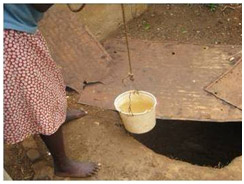Stories From the Field
Basic public health actions rapidly mobilized to lessen impact of cholera in earthquake-devastated Haiti

Many Haitians, especially those living in rural parts of the country, get their drinking water from unprotected sources, such as this well. A lack of basic water and sanitation services, compounded by inadequate hygiene behaviors, has greatly contributed to the current cholera crisis and will make it challenging to contain.
When the January 2010 earthquake struck Haiti, the first priorities of Haitian public health officials and their partners, includ¬ing CDC and USAID, were improving access to clean water and sanitation and promoting basic hygiene. They knew these basic public health actions could protect Haitians from threats they faced as a result of living in crowded, temporary camps.
Even before the January 2010 earthquake devastated much of Port-au-Prince, many Haitians lived without access to basic water and sanitation services. According to the WHO/UNICEF Joint Monitoring Program, only 71% of Haitians living in urban settings had access to an improved drinking water source—household connection, public standpipe, borehole, protected dug well, protected spring, or rainwater collection. Access for rural Haitians was even lower –only 55%. In addition, Haitians had limited access to resources that could turn any of these water sources into safe drinking water. Haitians' access to improved sanitation—connection to a public sewer or septic system, pour-flush latrine, simple pit latrine or ventilated improved pit latrine—was even more limited. Only 24% of urban Haitians had access to improved sanitation. Of Haitians living in rural Haiti (53% of the total population), only 51% had any type of sanitation coverage; an estimated 49% of rural Haitians rely on open defecation.
Dr. Eric Mintz, CDC epidemiologist and cholera expert, remarked, "Poor water and sanitation conditions are the reasons why cholera is such a big problem in Haiti. "Fortunately, we are helping the govern¬ment of Haiti take the steps needed to improve access to safe water and educate the public about basic hygiene that can pre¬vent cholera and other diarrheal diseases."
Despite the challenging circumstances, the Haitian Ministry of Health and Population (MSPP) and the National Directorate for Water and Sanitation (DINEPA) immediately set in place procedures to improve water quality through disinfection at the source and household level. CDC supported the Ministry's efforts to test drinking water supplies in the Port-au-Prince camps estab¬lished for Haitians displaced by the earth¬quake and helped to establish a portable lab to identify the organisms that affect water quality and cause disease, including cholera. CDC also trained people to moni¬tor drinking water outside of Port-au-Prince. When the first cases of cholera were confirmed by the Haitian National Public Health Laboratory in October 2010, the Government of Haiti, CDC, USAID, and other partners quickly developed educational materials for clinicians. Within a month, more than 400 clinicians were trained and spread across the country to share their new skills with other health workers. In addition, USAID rapidly mobilized to dis¬tribute soap, chlorine-based disinfectants, and other supplies to ensure Haitians could protect themselves through hand washing, cleaning, and purifying and safely storing water. Although some cholera cases have occurred in the camps that still serve as home for over 1 million persons displaced by the earthquake, major outbreaks in those camps have thus far been avoided and case fatality rates have been relatively low.
Mintz notes that much has been accomplished, but additional short- and long-term efforts are needed to address the cholera outbreak, which is expected to continue for a period of years unless the poor water and sanitation conditions are resolved.
CDC and USAID are working together on hygiene promotion and cholera preven¬tion campaigns. The short- and long-term cholera response in Haiti requires the Haitian government and the international community to expand the focus to water, sanitation, and hygiene efforts. USAID and CDC are currently assessing how to sup¬port the Haitian government and leverage efforts of other international partners to ensure the short- term effectiveness and continued sustainability of water, sanitation, and hygiene activities. Activities being considered include expanding household water treatment and safe water storage throughout Haiti, expanding the number of latrines and sanitation at heath facilities, chlorination of piped water supplies, wider distribution of soap for hand washing, and promotion of safe food-handling practices. Other long-term efforts, in partnership with the Haitian government, could include construction of physical infrastructure, training the Haitian workforce to operate and maintain the infrastructure and ongo¬ing health education to improve hygiene behaviors. The Haitian government and its partners are well aware that the country has a long way to go to reduce the burden of cholera and improve water, sanitation, and hygiene.
However past responses to cholera out¬breaks in Mexico and Chile show that improvements in water, sanitation, and hygiene are achievable. In Mexico, the government dramatically increased access to safe drinking water and sanitation, reducing deaths from diarrhea by 18% with only rare cases of cholera. In Chile, a similar response led to a similar reduction in cholera and decreases of 87% in typhoid fever and 61% in hepatitis A. "The good news is that we have seen other countries affected by cholera outbreaks successfully, over time, reduce deaths from cholera and eventually the impact of future outbreaks," Mintz said.
For the original story and more information, see CDC Global Health E-Brief.
Contact Us:
- Centers for Disease Control and Prevention
1600 Clifton Rd
Atlanta, GA 30333 - 800-CDC-INFO
(800-232-4636)
TTY: (888) 232-6348
24 Hours/Every Day - cdcinfo@cdc.gov


